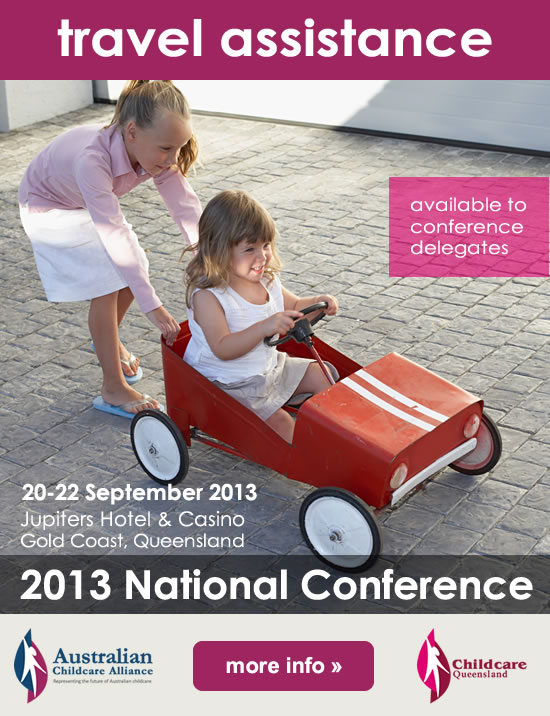
|
September 3, 2013 |
|
|
|
|
|
Welcome, this week learn what plans the major parties have for the child care sector following the election. Also why now is the time to review the level of asthma preparedness in your service. |
| Election 2013 |
| What's on the cards for child care: |
|
 Child care is shaping up to be a huge issue in this year's election for both the early childhood sector and families. Child care is shaping up to be a huge issue in this year's election for both the early childhood sector and families.
To help you make sense of all the hot air and rhetoric the election policies of the three main parties are summarised below.
The National Foundation for Australian Women (NFAW) has collated the stated election policies of the Coalition, Labor and the Greens and broken them into categories on affordability, availability, quality and workforce.
AFFORDABILITY
Coalition:
- Proposed Productivity Commission Inquiry into child care system to make it more affordable, flexible and accessible.
- Terms of reference include inquiry into day care and in home services including nannies and au pairs, as well as consideration of the out-of-pocket cost of child care and the rebates and subsidies available.
- Have ruled out means testing the Child Care Rebate if elected (Tony Abbott, interview 1/4/2012).
- Support continuation of the Child Care Benefit. Fiscal responsibility is paramount and any funding changes will be within the broad funding envelope. (Tony Abbott, Nov 2012).
continued…
|
|
|
|
|
| Changes to National Regulations |
| Effective 1 September 2013 |
|
 As of this month changes to the National Regulations kick off which ACECQA says will resolve several issues raised since the introduction of the NQF. As of this month changes to the National Regulations kick off which ACECQA says will resolve several issues raised since the introduction of the NQF.
The main amendments include:
- clarifying the definition of a 'serious incident' to help services know when they need to notify their regulatory authority
- reducing the amount of paperwork providers need to show when they want to temporarily relocate their premises for less than 12 months, which will be particularly helpful in emergencies such as flooded premises
- making it easier for centre-based service providers to educate and care for extra children in emergency situations by waiving space and educator-to-child ratios temporarily
- correcting an error that required the nominated supervisor to take part in every emergency and evacuation procedure every three months, including for family day care services where there is no nominated supervisor at the place where children are being educated and cared for. Centre-based and family day care services must rehearse evacuation procedures every three months, but only with those staff members, volunteers and children present on the day
- making it easier for educators to have their educational qualification assessed for equivalence, by removing the requirement to supply details of primary schooling, and in the case of qualifications from overseas, certification of the level of the qualification.
ACECQA is updating a range of resources to reflect the amendments including the NQF Resource Kit, the Operational Policy Manual, FAQs and information sheets.
|

|
| Parent |
| Testimonials |
| See what parents are saying about child care |
| View Here » |
|

|
 |

|

|

|
|

|
| Reach more parents |
| Our Premium and Enterprise services will increase parent enquiries to your child care business. |
| Find Out How » |
|
|

|
| Managing an asthma emergency
|
| Why you should brush up on training now |
|
 With the tragic death of an 8 year old boy in an out of school hours service recently ACECQA is reminding early childhood education and care providers that it is compulsory under the NQF to have educators trained in first aid, asthma management and anaphylaxis. With the tragic death of an 8 year old boy in an out of school hours service recently ACECQA is reminding early childhood education and care providers that it is compulsory under the NQF to have educators trained in first aid, asthma management and anaphylaxis.
As of this year national regulations came into effect making it mandatory for educators to have training in all three areas, prior to this there were different requirements in each state and territory.
The requirements apply to long day care, family day care, preschools, kindergartens and outside school hours care services.
All centre-based services must have at least one educator on site who is immediately available in an emergency who holds an approved first aid qualification and has undertaken approved anaphylaxis and emergency asthma management training.
continued…
|
|
|
|
|
|
|

|
 |
|
Have you been assessed? Publicise your services National Quality Standard Rating and promote your service's achievements - let us know
|


 Child care is shaping up to be a huge issue in this year's election for both the early childhood sector and families.
Child care is shaping up to be a huge issue in this year's election for both the early childhood sector and families.



 As of this month changes to the National Regulations kick off which ACECQA says will resolve several issues raised since the introduction of the NQF.
As of this month changes to the National Regulations kick off which ACECQA says will resolve several issues raised since the introduction of the NQF.

 With the tragic death of an 8 year old boy in an out of school hours service recently ACECQA is reminding early childhood education and care providers that it is compulsory under the NQF to have educators trained in first aid, asthma management and anaphylaxis.
With the tragic death of an 8 year old boy in an out of school hours service recently ACECQA is reminding early childhood education and care providers that it is compulsory under the NQF to have educators trained in first aid, asthma management and anaphylaxis.
